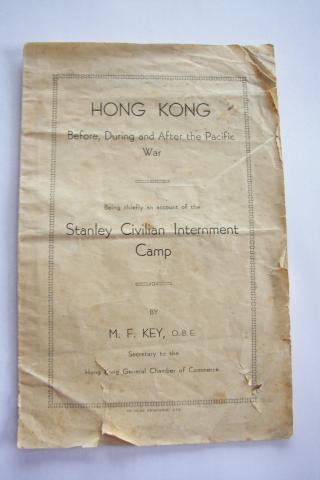PERSONAL COMMENT ON THE ORIGINAL BOOKLET
Mr Maurice Frederick Key (ref: 1925 Jurors List) published a small, 12 page, soft-cover BOOKLET, initially in Kaplee, Kapunda, Australia, in November 1945. Because of heavy demand, he re-produced the booklet in Hong Kong in June 1946.
A copy of this booklet is in my, R.H.J. BROOKS family's, possession. Though, as indicated in the introduction, a substantial amount of copies were produced, I have not seen nor heard of anyone having a copy - so presumably many have been lost over the years. I have therefore decided that it would be a shame for this important record, so earnestly put together by Mr Key, to disappear into oblivion. I have therefore decided to reproduce here, on GWULO, the whole booklet in its entirety.
There is no mention of Copyright on the booklet and so I feel confident that it would be his wish that this work, which substantiates so many others, is recorded for the greater benefit of all those interested in the events that transpired in this tragic period of Hong Kong's history.
Mr Key was an internee in Stanley Prison Camp during WWII. For some time he shared a room with the Vice-Chancellor of the University - (who was giving lectures at the camp on English literature for two years, twice a week).
The booklet cover is titled:
HONG KONG
Before, During and After the Pacific War
-- // --
Being chiefly an account of the
STANLEY CIVILIAN INTERNMENT CAMP
-- // --
BY
M.F. KEY, O.B.E.
Secretary to the
Hong Kong General Chamber of Commerce
Ye Olde Printerie Ltd
Sample pages
INTRODUCTION
This account of the Stanley Civilian Internment Camp in Hong Kong, written for the information of relatives and friends, reaches them via the "Kapunda Herald." The proprietor and editor of that paper, Mr L.N. Tilbrook, saw the m.s.s. and considered that the story would be of interest to his readers. After serial publication, the type was kept standing, and this pamphlet was made up therefrom.…
Pre-World War II
HONG KONG, small but important outpost of the British Empire, and particularly of Australasia in the in the Pacific War, passed through a period of unusual difficulty and anxiety before the blow fell on the 8th December, 1941. Japan’s long-continued effort to ’make friends’ with China at the point of the bayonet had driven refugees, both rich and poor, into Hong Kong by hundreds of thousands, until population figures rose from 850,000 to an estimated…
Precautionary Measures
Public expenditure had also greatly increased. Air raid tunnels – thought incapable of sheltering more than a tithe of the teeming population – had been constructed at a cost of $8,000,000. Further large expenditure built up a food and fuel reserve, large enough to furnish a siege ration for 150 days for two million people. More than $1,000,000 was needed to build decentralised stores (58 in number) for this vast quantity of food. Government…

Comments
MF Key
Hi:
just to say last week I was at Imperial War Museum Research room and I found they had an original copy of this memoire by Maurice Key in the Documents Collections. Best rgds, Philip Cracknell
Thanks for typing up and
Thanks for typing up and providing this, Suziepie. It's a valuable addition to internet Stanley resources.
HONG KONG Before, During and After the Pacific War
Thank you Brian and Phil for your comments. I guess you're wondering when I'll get it all finished! Unfortunately I've been busy with other things lately, but I'll now be able to make a point of getting the last parts done in the next few days.
Suziepie
re: HONG KONG Before, During and After the Pacific War
I see Suziepie has just finished typing the last section. It's an interesting read - thank you very much for sharing it with us.
Regards, David
Mr Key's account
Barbara Anslow writes:
Very many thanks for Mr Key's account, which I found an extremely interesting and concise record of the Hong Kong story.
I was surprised though that he didn't make more of the agonising 2 week gap in Stanley from the day we were told the war was over until the arrival of the British Fleet. Those 2 weeks seemed to go on forever, and we couldn't help wondering if the war really was over, and what would happen to us if the 'surrender' was suddenly revoked...